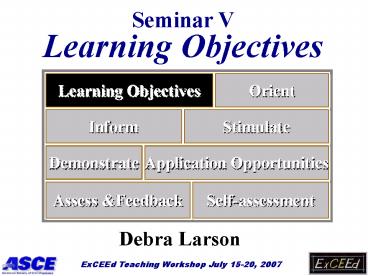Teaching Techniques - PowerPoint PPT Presentation
1 / 27
Title:
Teaching Techniques
Description:
Construct a learning objective. Appraise the usefulness of learning objectives. ... Noun = knowledge to acquire or construct. Action Verb List ... – PowerPoint PPT presentation
Number of Views:43
Avg rating:3.0/5.0
Title: Teaching Techniques
1
Seminar V Learning Objectives
Debra Larson
2
Muddiest Point on Effective Teaching
- Results
3
Think about the last class you taught.
- Can you list what you covered?
- Can you list what the students learned?
Why is question 1 easier to answer than question
2?
4
- A Technique That Helps Us Go Beyond
- Knowing About What We Tech
- To
- Knowing What Our Students Learn
Learning Objectives
5
Seminar Vs Learning Objectives
- Define learning objective.
- Classify learning objectives according to Blooms
Taxonomy. - Construct a learning objective.
- Appraise the usefulness of learning objectives.
6
Demo Class Is Lesson Objectives
- Define a truss.
- List the assumptions necessary to determine
internal forces in a truss. - Solve for internal forces in a truss member.
From this example, make at least one observation
about the characteristics of lesson learning
objectives.
7
Operational Definition
Lesson Content Stated in Learning Terms
- Describes what the students should be able to do
after - Completing the reading
- Attending class
- Completing the assignment
- Typically 2 to 4 per class
Action
8
Writing Learning Objectives
Action Verb List
- Start with action verbs
- That can be observed and measured
- Avoid
- Understand, know, be aware, appreciate
- Use
- Describe, construct, calculate, determine, list
- Use complete and simple sentences
- Verb process or behavior
- Noun knowledge to acquire or construct
9
Group Activity
- Individually
- Think about your first class that you will be
presenting on Tuesday afternoon. - For this class, write one lesson learning
objective. - With your neighbor
- Share your objective
- Refine it
- You have 5 minutes.
10
Describe Learning
- Three Domains of Learning
- cognitive (intellectual abilities)
- affective (attitudes, values, interests)
- psychomotor (muscular action, dexterity)
- Blooms ( others) Taxonomy
- 1956 a shared vocabulary ahead of its time
- 2001 Proposed Revisions
- Incorporated two small ones here
11
Blooms Taxonomy of Educational Objectives
For the Cognitive Domain
judge, critique, justify, verify, assess,
recommend
create, construct, design, improve, produce,
propose
compare, contrast, classify, categorize, derive,
model
calculate, solve, determine, apply
explain, paraphrase
list, recite
includes refinements by Anderson, et. al.
12
Example (Lesson-Level) Objectives
- Design the members of the structural steel truss
shown below to withstand the HS-20 truck load at
any point along the bridge.
Synthesize
13
Example(Lesson-Level) Objectives
- List the assumptions used in analyzing truss
structures.
Remember
14
Example (Lesson-Level) Objectives
- Compute the internal force in truss member AB.
Apply
15
Example (Lesson-Level) Objectives
- Assess the three truss designs shown below and
recommend the best solution. Explain.
Evaluate
16
So What?
At what level do we want our students to be
working at?
At what level of thinking are the first years of
higher education typically focused on?
17
So What?
- Undergraduate education tends to focus on the
lower level thinking skills. (Knowledge,
comprehension, application) - Ideally, all levels should be addressed in every
course - Ideally, all levels should be assessed in every
course
18
So What?
Students will operate at the level we expect them
to, if
- Communicate these expectations
- Use activities teaching strategies that support
expectations - Assess and evaluate performance
Learning Objectives
19
Group Activity
- Go back to your learning objective previously
written and with your neighbor - Determine what level of learning this objective
met. - Try to re-state it to increase its level.
- Be ready to present the results of this exercise
to the entire group. - You have 3 minutes.
20
Seminar Vs Learning ObjectivesWhere are We?
- Define learning objective.
- Classify learning objectives according to Blooms
Taxonomy. - Construct a learning objective.
- Appraise the usefulness of learning objectives?
21
Lets ReflectUseful For?
- Consider student learning
- Communicate lesson goals behavior expectations
to students others - Plan our lesson
- Align teaching strategies to desired learning
- Assess evaluate students performance
HOW?
22
Seminar Vs Learning Objectives
- Define learning objective.
- Classify learning objectives according to Blooms
Taxonomy. - Construct a learning objective.
- Appraise the usefulness of learning objectives.
23
Objectives and Assessment of Learning
24
Objectives and Assessment of Learning
25
Learning objectives shift us away from what we as
teachers are covering towards what our students
are learning.
- In Summary
Use learning objectives to set up a class where
higher levels of thinking are taught, learned,
practiced, evaluated, and assessed.
26
The 27-Second Teaching Quiz
If your score is gt than your age, you AND YOUR
STUDENTS are Winners!
27
References
- Wankat, P. and F. Oreovicz, 1993, Teaching
Engineering, McGraw-Hill, Inc. - Gardiner, L.F., Redesigning Higher Education
Producing Dramatic Gains in Student Learning,
AAHE-ERIC Higher Education Report, V 23, No. 7,
The George Washington University, Graduate School
of Human Development. - Anderson, L.W. and Others, 2001, A Taxonomy for
Learning, Teaching, and Assessing A Revision of
Blooms Taxonomy of Educational Objectives.
Addison Wesley Longman, Inc. - Baldizan, M.E. and McMullin, K.M., 2005,
Evaluation of Student Learning in an Engineering
Graphics Course. J. Prof. Issues in Eng. Ed. and
Practice. July. Pp. 192-198.































